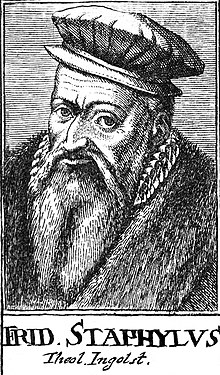Friedrich Staphylus

Friedrich Staphylus (Lat. Fridericus) (27 August 1512 –[1] 5 March 1564) was a German theologian, at first a Protestant and then a Catholic convert.
Biography
Staphylus was born at
About 1536 he went to
At this time Staphylus was still under the influence of Martin Luther's opinions, as is shown by his academic disputation upon the doctrine of justification, "De justificationis articulo". However, at his installation as professor he obtained the assurance that he need not remain if the duke tolerated errors which "might be contrary to the Holy Scriptures and the primitivœ apostolicœ et catholicœ ecclesiœ consensum". This shows that even then he regarded with suspicion the development of Protestantism.
At Königsberg he had a violent theological dispute with
Returning to Königsberg, a new dispute broke out between him and
After this he first entered the service of the
In 1560
After this he took an active part in the Catholic restoration in Bavaria and Austria. He drew up several opinions on reform for the
His learning and eloquence are frankly acknowledged by his Lutheran fellow-countryman Hermann Hamelmann.
Works
- Diodori Siculi fragmentary ex Greco in latinum versa
- Historia et Apologia Utriusque Partis, Catholicae Et Confessionariae, de dissolutione Colloquii nuper Wormatiae instituti ad omnes Catholicae fidei Protectores (Vienna, 1558)
- Theologiae Martini Lutheran Trimembris Epitome (Worms, 1558)
- Historam de vita, morte et gestis Caroli V (Augsburg, 1559)
- Defensio Pro Trimembri Theologia M. Lvtheri, Contra Aedificatores Babylonicae Tvrris. Phil Melanthonem, Shvvenckfeldianum Longinum, And. Musculum, Mat FLACC. Illyricum, Iacobum Andream Shmidelinum (Dillingen, 1561)
- Christian to report to the godly gemainen laity (Ingolstadt, 1561)
- Prodromus D. Friderici Staphyli, in Defensionem Apologiae suae, de vero germanoque scripturae sacrae intellectu etc. (Latine redditus by F. Laurentium Surium Carthusianum (Cologne, 1562))
- Hysterodromum
- Lucubrationes super plurimas sessions ad Concilium cum libris II De republica Christiana
- Oratio de bone litteris (1550)
- Synodus Patrum contra Osiandrum (1553)
- The Apologie of Fridericvs Staphylvs covnseller to the late emperovr Ferdinandvs, &c. (translated by Thomas Stapleton (Antwerp: John Latius, 1565)). Available on Google Books.
Literature
- Staphylus, Frederick or season. In: Zedler's Universal-Lexicon. Volume 39, Leipzig, 1744, column 1228 to 1230.
- Paul Tschackert: Staphylus, Frederick. In: Allgemeine Deutsche Biographie (ADB). Volume 35, Duncker & Humblot, Leipzig, 1893, pp. 457–461.
- Paul Tschackert: Staphylus, Frederick. In: Realencyklopädie für Protestantische Theologie and Kirche (RE). 3 Edition. Volume 18, Hinrichs, Leipzig, 1906, pp. 776–771.
- Ute Mennecke-Haustein: Staphylus, Frederick. In: Theologische Realenzyklopädie (TRE). Volume 32, de Gruyter, Berlin / New York, 2001, ISBN 3-11-016712-3, pp. 113–115.
References
- ^ McClintock, John (1889). Cyclopaedia of Biblical, Theological, and Ecclesiastical Literature. Harper & brothers. p. 989.
Staphylus.
- Staphylus, In causa religionis sparsim editi libri in unum volumen digesti (Ingolstadt, 1613)
- Tschackert, Urkundenbuch zur Reformationsgeschichte des Herzogtums Preussen, I and III (Leipzig, 1890), passim
- Soffner, Friedrich Staphylus (Breslau, 1904)
External links
![]() This article incorporates text from a publication now in the public domain: Herbermann, Charles, ed. (1913). "Friedrich Staphylus". Catholic Encyclopedia. New York: Robert Appleton Company.
This article incorporates text from a publication now in the public domain: Herbermann, Charles, ed. (1913). "Friedrich Staphylus". Catholic Encyclopedia. New York: Robert Appleton Company.
